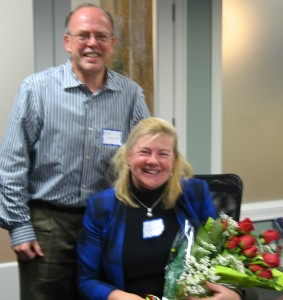When I read my invitation to the recent (September 23 and 24) US Department of Health and Human Services meeting regarding HAI prevention , it stated this was a meeting of “experts” to discuss progress in reducing Hospital Acquired Infections. Websters online dictionary definition of expert is “ one with the special skill or knowledge representing mastery of a particular subject “. I seriously wondered if I would be out of my element at this meeting.
Other experts there were doctors from Medical schools, hospitals, and the CDC, epidemiologists, hospital representatives of all professions,, nurses, respiratory therapists, representatives from CMS (Centers for Medicare/Medicaid, SHEA, APIC and so many others. How did I fit in?
The Consumers Union Safe Patient Project invited me as part of their ‘team’. Each of us in our group of 12 (out of 160 DHHS event attendees) has a personal experience with Hospital acquired infection or medical error. We have all taken on the task of making improvements and reducing risk to medical consumers in our own States and/or country. We sat at tables with all of the experts at the event and most of us had equal opportunity to speak our minds. WE ARE EXPERTS! I soon realized this. Not only are we experts, we are a group of well prepared, educated, aware and in touch advocates for all Medical Consumers. All of us have stayed by the bedside of a loved one while they suffered because of HAI or medical error, and some of us saw them die of HAI. One of our members had an infection herself and is still suffering the long term disability, pain, surgeries and loss caused by it. We saw the underbelly of the hospitals. We witnessed inadequate infection precautions and isolation. We saw our loved ones go from being independent to becoming totally dependent upon the care the hospital provided, inadequate or not. We watched the rapid decline of our loved ones’ health status and felt the helplessness and eventually hopelessness of the situation. We saw how caregivers avoided eye contact and conversations because of their guilt, shame and sometimes ignorance. We saw lack of disclosure of the full facts about the infections and descrimination against our loved ones because of the infection the hospital gave them. Above all, we saw the real raw suffering and we suffered too.
Not all of what we had to say was welcomed in these meetings, but every bit of it needs to be said, repeatedly if necessary. In the talk of data, numerators and denominators, data mining, process measures, prevention, technical and physical science, improvement or lack of improvement, remaining goals and work, cost, barriers to success, standardization of recommendations, etc etc etc, the suffering because of HAIs is almost never brought up. Also, the urgency of the problem in very rarely mentioned.
My CU colleagues and I bring the talks back to the PATIENTS and VICTIMS during these discussions. We make them remember our loved ones and ourselves, and the suffering and grief HAIs have brought to us. We all do it with intelligence, compassion, and eloquence. We are EXPERTS about what HAIs do to trusting vulnerable patients and we will continue to remind the other experts about why they do their work.
Zero HAIs is the only goal to set for these horrible infections. And 100% compliance on preventative bundles, handwashing and other preventative measures is the only level of compliance we will accept.
Thanks again to the CU for bringing me into this Union of Experts.
 On September 28, 2010, my colleague Lori Nurbonne had her first official Board of Directors meeting for the NHPV. This is Lori’s new non profit organization. Her goals are ambitious and excellent. She hopes to help patients of NH hospital become safer and infection free. She will do this by advocating for them, collecting their stories, proposing legislation for patient safety and working with her board, her family and friends, victims and with the Consumers Union to promote higher quality, safer care for all NH residents.
On September 28, 2010, my colleague Lori Nurbonne had her first official Board of Directors meeting for the NHPV. This is Lori’s new non profit organization. Her goals are ambitious and excellent. She hopes to help patients of NH hospital become safer and infection free. She will do this by advocating for them, collecting their stories, proposing legislation for patient safety and working with her board, her family and friends, victims and with the Consumers Union to promote higher quality, safer care for all NH residents. 